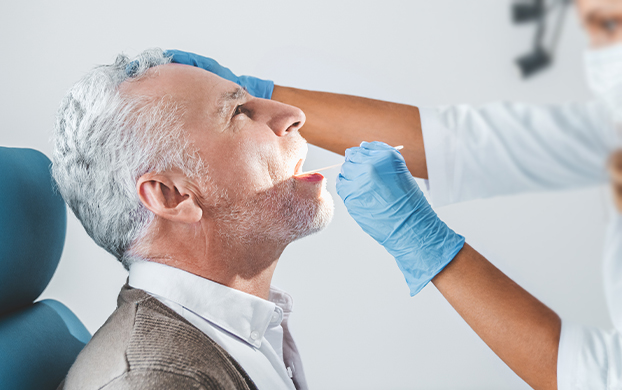Oral Cancer Screening

Early Oral Cancer Screenings
Oral cancer screenings can identify the signs of disease before it has spread. This may be beneficial to those in high-risk groups. Regular oral cancer screenings can give patients the advantage of treating cancer in the early stages when there is a higher chance for remission.
Oral cancer screenings are available at Cedar Grove Dental Group in Cedar Grove and the surrounding area. Early detection may make cancer treatment more effective. Call us at (973) 857-0567 to schedule an appointment today.
Why Have Regular Oral Cancer Screenings?
Regular oral cancer screenings are just as important as regular dental checkups. Patients can request to have both procedures done simultaneously. The National Cancer Institute states that oral cancer symptoms often do not show up until the disease has already spread. Detecting oral cancer early can lead to more successful treatment and higher chances of remission.
WebMD recommends that everyone should have a dental checkup at least once a year. However, there is no consensus among experts on how often patients should have oral cancer screenings. A dentist can perform a thorough examination to determine the appropriate frequency for screenings.
“Early detection may make oral cancer easier to treat when the chances for remission are higher.”
Oral Cancer: Groups with Elevated Risk
- A history of oral cancer
- Certain types of human papillomavirus (HPV)
- Regular consumption of a lot of alcohol
- Excessive amounts of time spent in the sun
- Tobacco use, in any form
“Some groups may benefit from regular oral cancer screenings more than others.”
Oral Cancer Screenings: What You Need to Know
Regular oral cancer screenings are important for maintaining good health, but Mayo Clinic warns that abnormal cells may not always be detected through a visual exam. This means there is a chance that a small sign of cancer or precancerous lesion could be missed.
Having unusual cells does not automatically mean a patient has cancer. A biopsy is necessary to confirm a diagnosis. Early detection of cancer allows for more treatment options.
Although screenings have not been proven to reduce oral cancer deaths, they can help catch cancers early when remission is more possible.
“While the evidence does not yet link screenings with reduced oral cancer deaths, regular screenings may help identify cancers early at a time when remission is more likely.”
During an oral cancer screening, here's what you can expect:
- The back of the throat
- The gums
- The insides of the cheeks
- The outside and the inside of the lips
- The roof of the mouth
- The tongue
“There is no special preparation required for an oral cancer screening, and patients can typically expect screening to take place during a routine dental appointment.”
Additional Tests After Oral Cancer Screenings
The dentist may conduct special tests in addition to the basic screening, depending on the patient's situation. More thorough oral cancer screenings may involve rinsing the mouth with blue dye to enhance visibility of unusual cells. The dentist may also use a light to highlight abnormal tissue by making it appear white during the exam.
If any of these tests detect signs of oral cancer or potentially cancerous lesions, a biopsy may be recommended. This involves removing a sample of cells for laboratory testing. The patient may also need to schedule a follow-up appointment to monitor any changes in the abnormal area since detection.




